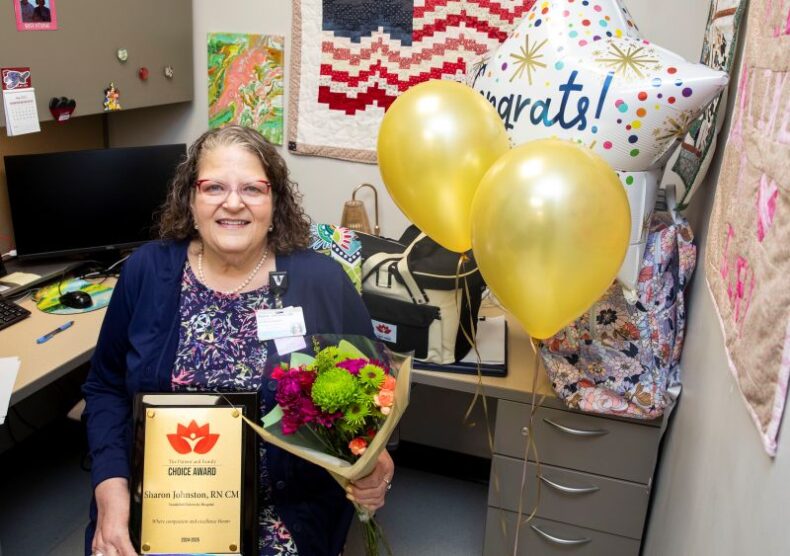Kyle and Katie Mullicane.
Kyle Mullicane’s lungs, kidneys and pancreas were failing and as he became critically ill in the Surgical Intensive Care Unit (SICU), he started hallucinating.
“The first thing I remember, I was in the elevator, in this stainless steel elevator,” said Mullicane, 35, of Murfreesboro. “No clue what was going on. I just remembered being in a lot of pain and there was a doctor there who looked just like Phillip Seymour Hoffman (the late actor.) He was telling me everything that was going to be happening and how things didn’t look good. I thought he was a terrible doctor.
“One of the first questions I asked my wife when I woke up, I was like, ‘who is the doctor that looks like Phillip Seymour Hoffman?’ She said there wasn’t one. That’s when I realized that was a hallucination.”
Mullicane, admitted to Vanderbilt in July due to necrotizing pancreatitis, was spiraling into multiorgan failure, and, frankly, most of his doctors thought he wouldn’t make it.
“There was a period of time where we didn’t think we were going to capture him and bring him back,” said Liza Weavind, MBBCh, MMHC, medical co-director of the Surgical Intensive Care Unit (SICU) and part of Mullicane’s care team. “Intensive and vigilant care coupled with incredible nursing care and a young patient with physiologic reserve is a combination to allow for healing and recovery.”
Doctors performed five surgeries in nine days to save Mullicane’s life. He ended up spending nearly a month in the SICU.
“I am most thankful for the care team and the culture that you all have created because that doesn’t happen accidentally,” he said. “And it really shows.”
Now recovered, he recounted his experience before a roomful of people in Light Hall at Bedside Matters, a monthly rounds geared toward helping VUMC employees deal with social and emotional issues in caring for patients and families in difficult times. Weavind said Mullicane is one of the SICU’s “Great Saves” of 2019 — an unexpected recovery from dire critical illness.
Mullicane said the first time he met Weavind she was in Las Vegas, waiting tables at a steakhouse.
“You might not remember it because it didn’t happen,” Mullicane joked. It was just another hallucination.
Mullicane can joke about it now, but his delirium was taxing to his care team. He fought his medical care and his medical care team. Just a set of doors opening near his room on the ninth floor sounded like a car crash to him, and he would taste glass in his mouth every time they opened, his wife, Katie, recalled.
Katie Mullicane said either she or Kyle’s mother would attend rounds every morning, which she found “extremely empowering.” The SICU multidisciplinary team has a patient-and-family- centric approach, which allows families to participate and ask questions in daily rounds to discuss the events that occurred overnight and the plan of care for the day.
For days, the news was not good.
“Being told day after day by surgeons that see the worst of the worst that he may not pull through, that was the hardest,” Katie said. “I mean, I have a 35-year-old, really bright, big-shouldered, intelligent force of life, he’s got this huge personality. And being told he was going to die? Are you kidding me?”
Her husband recovered in fits and starts. For example, after 16 days in the SICU, he was extubated and started receiving physical therapy and attempted to move around. But he had a major setback four days later, having seizures and requiring to be re-intubated. A day later, he was extubated and began to steadily recover.
Once his mental state returned to normal, Kyle Mullicane developed a major goal with his physical and occupational therapists — to be able to drive his daughter, Harper, to her first day of kindergarten.
“Once that goal was established, even though it might have been a completely ridiculous goal, I felt like the whole SICU team was working toward that as well,” he said.
Sure enough, he was discharged one day before her first day. And he walked her into kindergarten.
“I am most thankful for the care team and the culture that you all have created because that doesn’t happen accidentally,” he said. “And it really shows.”
Now Kyle Mullicane’s heart has returned to nearly normal, and his kidney and pancreas are fine.
“I am so thankful for Vanderbilt University Medical Center,” Katie Mullicane said. “We will bleed black and gold for the rest of our lives. We really do love this place and we love all of you.”
Bedside Matters, a brown-bag lunch event, is held at noon on the third Wednesday each month in Light Hall. All VUMC employees are invited.
Details and room numbers for future events can be found at https://ww2.mc.vanderbilt.edu/bedsidematters/48481
Contact hours are available by watching the event live or online, but Continuing Medical Education (CME) credits are currently only available for the live event.


















